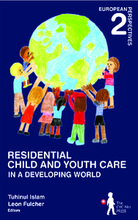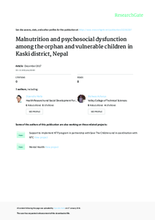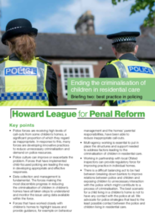Displaying 761 - 770 of 1510
This review seeks to identify and summarise findings from literature about the nature of relationships that develop between older children and young people, and those caring for them within and beyond residential and fostering settings.
The purpose of the present Situation Analysis of Children with Disabilities in Albania is to generate comprehensive knowledge about children with disabilities to inform concrete actions by the Albanian government and UNICEF Albania to address the most critical rights violations of children with disabilities.
This article discusses how important it is for children in residential care to develop the ability to navigate relationships with each other.
This study explored the perceptions of experts and guardians regarding the early onset of misbehaviour in male, at-risk children in child and youth care centres in South Africa.
Exploring the testimonials collected during a focus group and 45 individual interviews with adult alumni of such institutions the Romanian research team enrolled in the SASCA Project revealed a wide range of forms of violence and traumatic consequences.
Building on Volume 1 of the Residential Child and Youth Care in a Developing World Series that used the FIFA Football Confederation Regions to step outside contemporary discourses about residential child and youth care, further contributions from 23 UEFA countries are offered in this second volume which follows.
The objective of this study was to assess malnutrition and psychosocial dysfunction among vulnerable children as well as to determine the association between malnutrition and psychosocial dysfunction among orphan and vulnerable children in Kaski district, Nepal.
This article presents the findings of a study that examined the emotional health status and coping mechanisms of adolescents living in residential care facilities in Malaysia, in comparison with that of adolescents living in families.
This is the second briefing paper published as part of the Howard League’s two-year programme to end the criminalisation of children in residential care. It explores how good practice in the policing of children’s homes can significantly reduce the unnecessary criminalisation of vulnerable children and demand on police resources.
In this video, Catholic Relief Services, Lumos, and Maestral International presented their project: Changing the Way We Care, a project aimed at ending the institutionalization of children.





